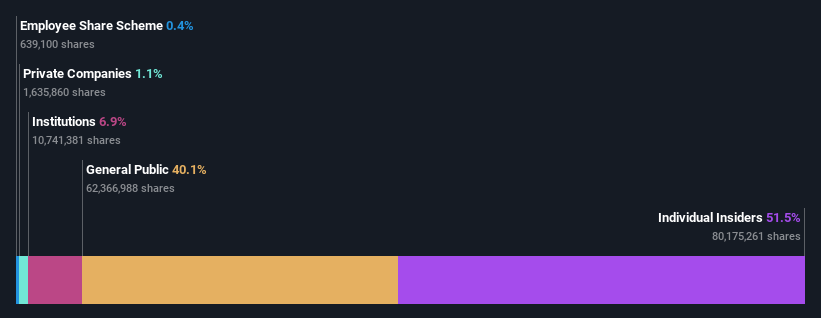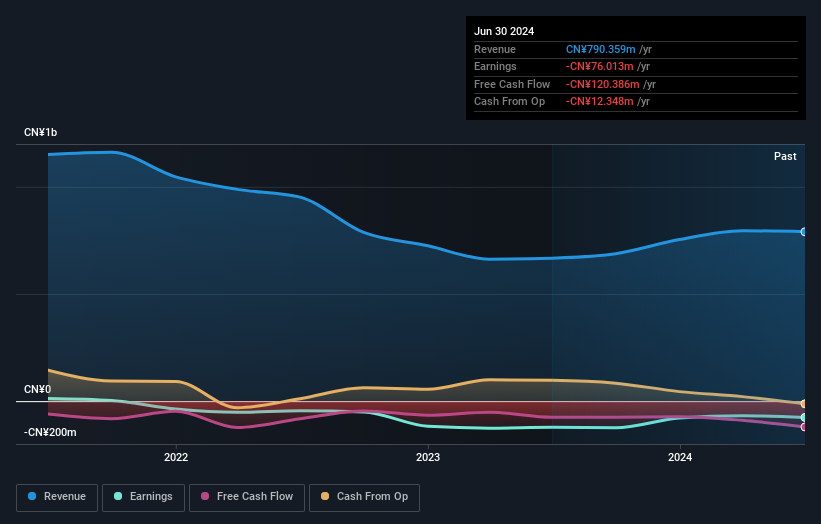YingTong Telecommunication Co.,Ltd. (SZSE:002861) CEO Hui Huang's holdings dropped 16% in value as a result of the recent pullback
Key Insights
- Significant insider control over YingTong TelecommunicationLtd implies vested interests in company growth
- A total of 5 investors have a majority stake in the company with 51% ownership
- Ownership research, combined with past performance data can help provide a good understanding of opportunities in a stock
To get a sense of who is truly in control of YingTong Telecommunication Co.,Ltd. (SZSE:002861), it is important to understand the ownership structure of the business. With 52% stake, individual insiders possess the maximum shares in the company. Put another way, the group faces the maximum upside potential (or downside risk).
As market cap fell to CN¥1.9b last week, insiders would have faced the highest losses than any other shareholder groups of the company.
In the chart below, we zoom in on the different ownership groups of YingTong TelecommunicationLtd.
Check out our latest analysis for YingTong TelecommunicationLtd

What Does The Institutional Ownership Tell Us About YingTong TelecommunicationLtd?
Many institutions measure their performance against an index that approximates the local market. So they usually pay more attention to companies that are included in major indices.
YingTong TelecommunicationLtd already has institutions on the share registry. Indeed, they own a respectable stake in the company. This implies the analysts working for those institutions have looked at the stock and they like it. But just like anyone else, they could be wrong. If multiple institutions change their view on a stock at the same time, you could see the share price drop fast. It's therefore worth looking at YingTong TelecommunicationLtd's earnings history below. Of course, the future is what really matters.

Hedge funds don't have many shares in YingTong TelecommunicationLtd. The company's CEO Hui Huang is the largest shareholder with 29% of shares outstanding. For context, the second largest shareholder holds about 8.7% of the shares outstanding, followed by an ownership of 6.3% by the third-largest shareholder.
To make our study more interesting, we found that the top 5 shareholders control more than half of the company which implies that this group has considerable sway over the company's decision-making.
While it makes sense to study institutional ownership data for a company, it also makes sense to study analyst sentiments to know which way the wind is blowing. Our information suggests that there isn't any analyst coverage of the stock, so it is probably little known.
Insider Ownership Of YingTong TelecommunicationLtd
The definition of company insiders can be subjective and does vary between jurisdictions. Our data reflects individual insiders, capturing board members at the very least. Management ultimately answers to the board. However, it is not uncommon for managers to be executive board members, especially if they are a founder or the CEO.
Insider ownership is positive when it signals leadership are thinking like the true owners of the company. However, high insider ownership can also give immense power to a small group within the company. This can be negative in some circumstances.
It seems that insiders own more than half the YingTong Telecommunication Co.,Ltd. stock. This gives them a lot of power. That means they own CN¥985m worth of shares in the CN¥1.9b company. That's quite meaningful. It is good to see this level of investment. You can check here to see if those insiders have been buying recently.
General Public Ownership
With a 40% ownership, the general public, mostly comprising of individual investors, have some degree of sway over YingTong TelecommunicationLtd. While this size of ownership may not be enough to sway a policy decision in their favour, they can still make a collective impact on company policies.
Next Steps:
It's always worth thinking about the different groups who own shares in a company. But to understand YingTong TelecommunicationLtd better, we need to consider many other factors. For instance, we've identified 3 warning signs for YingTong TelecommunicationLtd that you should be aware of.
Of course this may not be the best stock to buy. Therefore, you may wish to see our free collection of interesting prospects boasting favorable financials.
NB: Figures in this article are calculated using data from the last twelve months, which refer to the 12-month period ending on the last date of the month the financial statement is dated. This may not be consistent with full year annual report figures.
Have feedback on this article? Concerned about the content? Get in touch with us directly. Alternatively, email editorial-team (at) simplywallst.com.
This article by Simply Wall St is general in nature. We provide commentary based on historical data and analyst forecasts only using an unbiased methodology and our articles are not intended to be financial advice. It does not constitute a recommendation to buy or sell any stock, and does not take account of your objectives, or your financial situation. We aim to bring you long-term focused analysis driven by fundamental data. Note that our analysis may not factor in the latest price-sensitive company announcements or qualitative material. Simply Wall St has no position in any stocks mentioned.
 Index Options
Index Options CME Group
CME Group Nasdaq
Nasdaq Cboe
Cboe TradingView
TradingView Wall Street Journal
Wall Street Journal